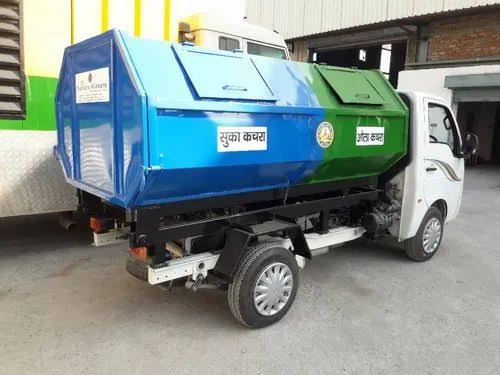A trash tipper, also known as a garbage tipper or refuse tipper, is a specialized vehicle designed for the collection and transportation of various types of solid waste. It offers several benefits in waste management and sanitation systems. Here's some content highlighting the matter and benefits of a trash tipper:
A trash tipper is an essential piece of equipment in waste management operations. It is specifically designed to streamline the process of waste collection, ensuring efficient and sanitary disposal of solid waste. Trash tippers are equipped with specialized lifting and tipping mechanisms that facilitate the easy loading and unloading of waste containers or bins, minimizing manual labor and enhancing operational efficiency.
These vehicles are designed to handle various types of solid waste, including household waste, commercial waste, industrial waste, and construction debris. They come in different configurations, such as rear-loading, front-loading, or side-loading, to accommodate different waste collection requirements and container sizes.
Trash tippers are equipped with hydraulics systems that enable controlled and precise lifting and tipping of waste containers. This ensures that the waste is safely and efficiently emptied into the truck's storage compartment. The hydraulics system also enhances operator safety and minimizes the risk of accidents or injuries during the waste collection process.
Benefits of a Trash Tipper:
1. Efficient Waste Collection: Trash tippers enable efficient waste collection by automating the process of loading and unloading waste containers. The specialized lifting and tipping mechanisms reduce the time and effort required for manual handling of waste, resulting in increased productivity and faster waste collection cycles.
2. Improved Sanitation and Hygiene: Trash tippers contribute to improved sanitation and hygiene by facilitating proper waste containment and disposal. They prevent the spillage and scattering of waste during the collection process, minimizing litter and reducing the risk of disease transmission.
3. Time and Labor Savings: By automating waste collection and minimizing manual labor, trash tippers save time and labor costs for waste management operations. The efficient loading and unloading process allows waste collection crews to cover more areas in less time, optimizing operational efficiency.
4. Enhanced Safety: Trash tippers are designed with safety features to protect both operators and the general public. These features may include warning signs, backup alarms, safety interlocks, and cameras to ensure safe operation and prevent accidents during the waste collection and tipping process.
5. Versatility and Adaptability: Trash tippers come in different configurations to suit various waste collection scenarios. They can handle different container sizes and types, making them adaptable to residential, commercial, and industrial waste collection needs.
6. Environmental Sustainability: By ensuring proper waste collection and containment, trash tippers contribute to environmental sustainability. They minimize the risk of waste pollution and help maintain clean and healthy surroundings, promoting a greener and more sustainable environment.
7. Cost-Effectiveness: Trash tippers offer cost savings in waste management operations. Their efficient waste collection process reduces labor costs and increases productivity. Additionally, they optimize waste transportation by maximizing the storage capacity of the truck, minimizing the number of trips required for waste disposal.
Summary:-
A trash tipper provides an efficient, safe, and hygienic solution for waste collection and transportation. Its benefits include efficient waste collection, improved sanitation and hygiene, time and labor savings, enhanced safety, versatility, environmental sustainability, and cost-effectiveness. By utilizing a trash tipper, waste management operations can streamline their processes, promote cleaner surroundings, and contribute to a more sustainable future.

